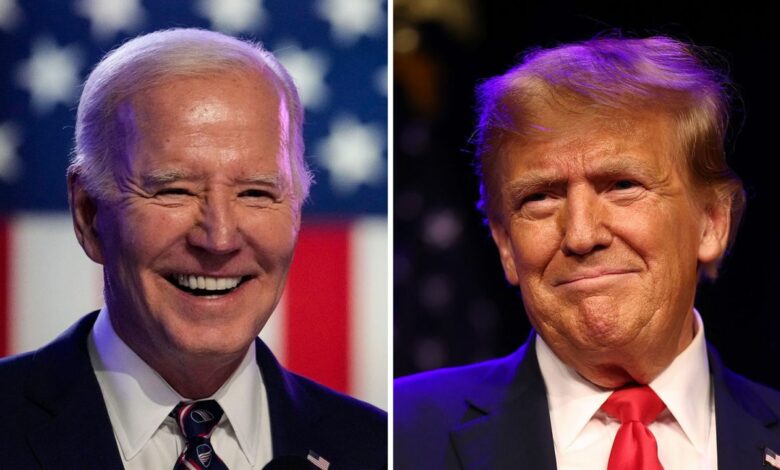
Biden’s victory in the Democratic primary came with a warning from progressives, young voters and Arab American Democrats in the form of an “uncommitted” protest vote: Change course on Israel’s war in Gaza or risk losing a significant chunk of support in what could be a decisive general election state.
On the GOP side, Trump’s win also failed to conceal a potentially damaging weakness. Once again, a sizable portion of Republicans came out to vote against the unquestioned leader of their party. That it happened in Michigan, one of the handful of states that swung from Trump in 2016 to Biden in 2020, gives those concerns – and the actions fueling them – outsize importance in a contest where both candidates need strong base turnout to stand a chance in November.
Here are the takeaways from the 2024 Michigan presidential primary:
November warning signs for Biden and Trump
Despite a recent tweak in rhetoric, and some eleventh-hour chatter about an imminent ceasefire, Biden and his team have stood by Israel’s right to defend itself. More than 29,000 Palestinians have been killed so far in Gaza, according to the Hamas-run Ministry of Health, in response to Hamas’ October 7 attacks on Israel. And as the civilian death toll – including thousands of children – continues to rise, so too has pressure grown on Biden to publicly push for a ceasefire.
In the run-up to the primary, a coalition called Listen to Michigan asked Democrats unhappy with Biden’s handling of the war, along with those critical of the US role in arming Israel’s military, to vote “uncommitted” – to send a message to the White House that what happens in the coming days and weeks could upend an election still more eight months away. Around midnight ET, with about 50 percent of the votes counted, “uncommitted” was hovering at around 13 percent, a raw total well in excess of Trump’s margin of victory in 2016. (A Biden campaign email touting the president’s Michigan win made no mention or hint of the Israel-Hamas conflict.)
Concern among Biden allies became palpable in the days before the primary. Michigan Gov. Gretchen Whitmer’s argument “that any vote that’s not cast for Joe Biden supports a second Trump term,” as she said to CNN’s Dana Bash on Sunday, either fell flat or cut into an even larger protest vote. Michigan Rep. Debbie Dingell, the Democrats’ Cassandra figure of 2016, has been sounding the alarm for longer, warning of damaging political fallout for Biden.
For Trump, the roughly 30 percent of Republicans who voted either for former South Carolina Gov. Nikki Haley or on the GOP’s “uncommitted” line might be more difficult to parse. Though his third presidential nomination in three tries could be clinched in a few weeks, the fact remains that a sizable group of Republicans are either firmly opposed to him or still to be won over – including in a state that he won by a sliver in 2016 and then lost to Biden by roughly 150,000 votes four years later.
‘Uncommitted’ campaign claims success
Supporters of the movement urging Michigan Democratic voters to check “uncommitted” said their campaign had been a success because it had attracted enough votes to get Biden’s attention.
“We know Joe Biden is going to be our nominee. So it’s a very, very significant outcome,” former Michigan Rep. Andy Levin, a supporter of the “uncommitted” effort, told CNN on Tuesday night. “My worry was that this primary would happen, and the president wouldn’t get the message about how mad people are.”
Levin said he thought that the message that Biden can’t win Michigan in November unless he “changes course” had been “effectively communicated” through Tuesday’s result.
The “uncommitted” campaign kept its focus narrow, aiming to convince Biden’s White House to seek a permanent ceasefire in the Israel-Hamas conflict.
“We are moving in the traditions of anti-war protesters who came before us,” Abbas Alawieh, a spokesman for Listen to Michigan, said at the group’s gathering at a Middle Eastern restaurant in Dearborn. Alawieh called for a moment of silence for the children killed in Gaza. “Stop killing our families, that’s all we’re asking for,” he said.
Perhaps the biggest question is whether Michigan’s “uncommitted” effort will spawn copycats — and if so, whether those campaigns will draw much of the vote in their own states’ primaries.
Progressives in Minnesota, another Midwestern state with a sizable Muslim population, launched a similar push for uncommitted votes ahead of its Super Tuesday primary, arguing that the contest – a low-stakes affair, with Biden all but guaranteed of winning the 2024 Democratic nomination — is the best time to attempt to send a message to the president.
Time is running out for Haley
Haley again failed to deliver the momentum-changing win that she needed — and her margins are shrinking, rather than growing, as time runs out.
The Republican race is accelerating, with more than one-third of the party’s delegates at stake in next week’s Super Tuesday contests and 56 percent of its delegates set to be awarded by March 12.
An underdog presidential contender’s odds only grow longer as the race shifts out of the early voting states, where retail politics make a difference, and onto the national stage, where money and momentum matter most.
Because many contests award delegates on a winner-take-all basis, close calls won’t help Haley keep pace. And the outcome in Michigan was not a close call.
Haley told CNN’s Dana Bash her goal in Michigan was “to be as competitive as possible.” But the former South Carolina governor hasn’t yet made any state particularly competitive — with an 11-point loss in New Hampshire the closest she’s come to Trump.
Haley’s campaign sought to sell the Michigan results as a sign of the weaknesses of both Trump and Biden.
“Joe Biden is losing about 20 percent of the Democratic vote today, and many say it’s a sign of his weakness in November. Donald Trump is losing about 35 percent of the vote. That’s a flashing warning sign for Trump in November,” Haley campaign spokeswoman Olivia Perez-Cubas said in a statement.
However, results in the party’s primaries and caucuses so far show that GOP voters aren’t swayed by her argument that she’s better positioned than Trump to beat Biden in November. That argument also fell flat in Michigan, where Haley pinned the GOP’s loss of the governor’s office and control of the legislature in recent years on Trump.
The disappearing Dean Phillips
As votes were tallied late Tuesday night, Minnesota Rep. Dean Phillips’ best hope was to avoid finishing fourth in a two-person primary.
His quixotic and little-noticed bid to challenge Biden continued to fall flat, as those dissatisfied with the president over his support for Israel in its war with Hamas chose to cast protest votes for “uncommitted,” rather than supporting the only actual alternative Democratic candidate in the race.
Even more embarrassing for Phillips: He was neck-and-neck with Marianne Williamson — the author and public speaker who ended her own long-shot campaign weeks ago.
Phillips’ high point was in New Hampshire, where he drew nearly 20 percent of the Democratic primary vote. But Biden wasn’t on the ballot — he skipped the contest after Granite State officials refused to honor the Democratic National Committee’s new primary calendar — and no delegates were at stake there. Biden crushed Phillips with write-in votes, anyway.
The first Midwestern contest should have been an opportunity for Phillips to make his mark. Instead, on Tuesday night, he took to X, the platform formerly known as Twitter, and said: “If you resent me for the audacity to challenge Joe Biden, at least you’ll appreciate how relatively strong I’m making him look among primary voters!”
Another Michigan GOP contest Saturday
Only 16 of Michigan’s 55 delegates to the Republican National Convention were at stake in Tuesday’s primary. The rest will be awarded at a state party convention Saturday.
The split contests are the result of Republicans’ reaction to Democrats’ decision to shake up the party’s presidential nominating calendar after the 2020 election — demoting Iowa and New Hampshire, moving South Carolina and Nevada to the forefront and placing Michigan third in their new lineup.
Republicans opposed an earlier Michigan primary, which violated Republican National Committee rules limiting which states can hold contests before March 1. After Democrats, who control the legislature and the governor’s office, moved the Michigan primary to February 27 despite the Republican opposition, the RNC and the Michigan GOP came up with the hybrid model.
Further complicating matters: The Michigan GOP is in the middle of a battle over who actually leads the party, with two people who claim to be the party’s leaders scheduling dueling conventions Saturday.
The RNC and Trump have recognized Pete Hoekstra, a former congressman and US ambassador to the Netherlands, as chair; Hoekstra scheduled a Saturday convention in Grand Rapids. However, Kristina Karamo, the election conspiracy theorist who the state party voted to oust in January, has refused to relinquish control, arguing that she was unlawfully removed. She has planned a convention in Detroit.
Kent County Circuit Court Judge J. Joseph Rossi on Tuesday affirmed Karamo’s removal as state party chair, saying that any actions she has taken since then on behalf of the party were “void and have no effect.” She has not yet said whether the convention she planned for Detroit would go forward.
Regardless of Karamo’s actions, the RNC’s decision to recognize Hoekstra signaled that the party would accept delegates from the convention he will oversee.
This story has been updated with additional information.




